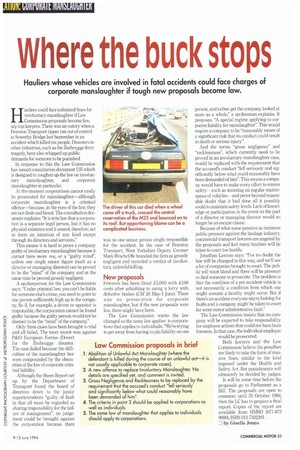Where the buck stops
Page 37

If you've noticed an error in this article please click here to report it so we can fix it.
Hauliers whose vehicles are involved in fatal accidents could face charges of corporate manslaughter if tough new proposals become law.
Hauliers could face unlimited fines for involuntary manslaughter if Law Commission proposals become law, say top lawyers. There was an outcry when a Fewston Transport tipper ran out of control at Sowerby Bridge last September in an accident which killed six people. Disasters in other industries, such as the Zeebrugge ferry tragedy, have also whipped up public demands for someone to be punished.
In response to this the Law Commission has issued consultation document 135 which is designed to toughen up the law on involuntary manslaughter, and corporate manslaughter in particular.
At the moment corporations cannot easily be prosecuted for manslaughter—although corporate manslaughter is a criminal offence—because, in the eyes of the law, they are not flesh and blood. The consultation document explains: "It is trite law that a corporation is a separate legal person, but it has no physical existence and it cannot, therefore, act or form an intention of any kind except through its directors and servants."
This means it is hard to prove a company guilty of involuntary manslaughter because it cannot have mens rea, or a "guilty mind", unless one single senior figure (such as a director or managing director) can be proved to be the "mind" of the company and at the same time be proved grossly negligent.
A spokesperson for the Law Commission says: "Under criminal law, you can't be liable for someone else's crime; you need to point to one person sufficiently high up in the company. So if, for example, a driver or operator is responsible, the corporation cannot be found guilty because the guilty person would not be deemed to be the "mind" of the company" Only three cases have been brought to trial and all failed. The most recent was against P&O European Ferries (Dover) for the Zeebrugge disaster. The case failed because the difficulties of the manslaughter law were compounded by the obscurities of the law of corporate criminal liability.
Although the Sheen Report set up by the Department of Transport found the board of directors down to the junior superintendents "guilty of fault in that all must be regarded as sharing responsibility for the failure of management", no judgement could be brought against the corporation because there was no one senior person singly responsible for the accident. In the case of Fewston Transport, West Yorkshire Deputy Coroner Mark Hinchcliffe branded the firm as grossly negligent and recorded a verdict of involuntary, unlawful killing.
New proposals
Fewston has been fined £5,000 with £100 costs after admitting to using a lorry with defective brakes (CM 26 May-1 June). There was no prosecution for corporate manslaughter, but if the new proposals were law, there might have been.
The Law Commission wants the law changed so the same law applies to corporations that applies to individuals. "We're trying to get away from having to pin liability on one person, and rather get the company looked at more as a whole," a spokesman explains. It proposes. "A special regime applying to corporate liability for manslaughter". This would require a company to be "reasonably aware of a significant risk that its conduct could result in death or serious injury".
And the terms "gross negligence" and "recklessness", which currently need to be proved in an involuntary manslaughter case, would be replaced with the requirement that the accused's conduct "fell seriously and significantly below what could reasonably have been demanded of him". This means a company would have to make every effort to ensure safety—such as insisting on regular maintenance of vehicles—and prove beyond reasonable doubt that it had done all it possibly could to maintain safety levels. Lack of knowledge or participation in the event on the part of a director or managing director would no longer be an escape clause.
Because of what some perceive as immense public pressure against the haulage industry, commercial transport lawyers are angered by the proposals and feel many hauliers will be taken to court too hastily.
Jonathan Lawton says: "I've no doubt the law will be changed in this way, and we'll see a lot of companies brought to court. The public will want blood and there will be pressure to find someone to prosecute. The problem is that the condition of a pre-accident vehicle is not necessarily a condition from which one might assume a fatality might occur. But if there's an accident everyone starts looking for faults and a company might be taken to court for some minor administrative fault."
The Law Commission insists that no company will be expected to take responsibility for employee actions that could not have been foreseen. In that case, the individual employee would be prosecuted.
Both lawyers and the Law Commission believe the penalties are likely to take the form of massive fines, similar to the kind imposed under the Health and Safety Act. But punishments will ultimately be decided by judges.
It will be some time before the proposals go to Parliament as a Bill. The proposals are open to comment until 31 October 1994; then the LC has to prepare a final report. Copies of the report are available from I-LVISO (071-873 9090), ISBN 011 730220i.
by Giselle Jones




























































































